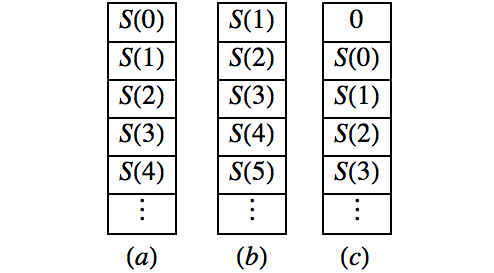We prove (a) by induction and leave the proof of (b) to the reader.
Basis:
\begin{equation*}
\begin{split}
G(S\uparrow;z) &= \sum_{k=0}^{\infty} S(k+1) z^k\\
& =\sum_{k=1}^{\infty} S(k) z^{k-1}\\
& =\left.\left(\sum_{k=1}^{\infty} S(k) z^k\right)\right/z\\
& =\left.\left(S(0)+\sum_{k=1}^{\infty} S(k) z^k-S(0)\right)\right/z\\
& =(G(S;z)-S(0))/z
\end{split}
\end{equation*}
Therefore, part (a) is true for \(p=1\text{.}\)
Induction: Suppose that for some \(p\geq 1\text{,}\) the statement in part (a) is true:
\begin{equation*}
\begin{split}
G(S\uparrow (p+1);z) &= G((S\uparrow p)\uparrow ;z)\\
& = (G(S\uparrow p ;z)-(S\uparrow p)(0))/z \textrm{ by the basis}\\
& = \frac{\frac{\left(G(S;z)-\sum_{k=0}^{p-1} S(k)
z^k\right)}{z^p}-S(p)}{z}
\end{split}
\end{equation*}
by the induction hypothesis. Now write \(S(p)\) in the last expression above as \(\left(S(p)z^p \right)/z^p\) so that it fits into the finite summation:
\begin{equation*}
\begin{split}
G(S\uparrow (p+1);z) & =\left.\left(\frac{G(S;z)-\sum_{k=0}^p S(k)
z^k}{z^p}\right)\right/z\\
& = \left(G(S;z)-\sum_{k=0}^p S(k) z^k\right)/z^{p+1}
\end{split}
\end{equation*}
Therefore the statement is true for \(p+1\text{.}\)

